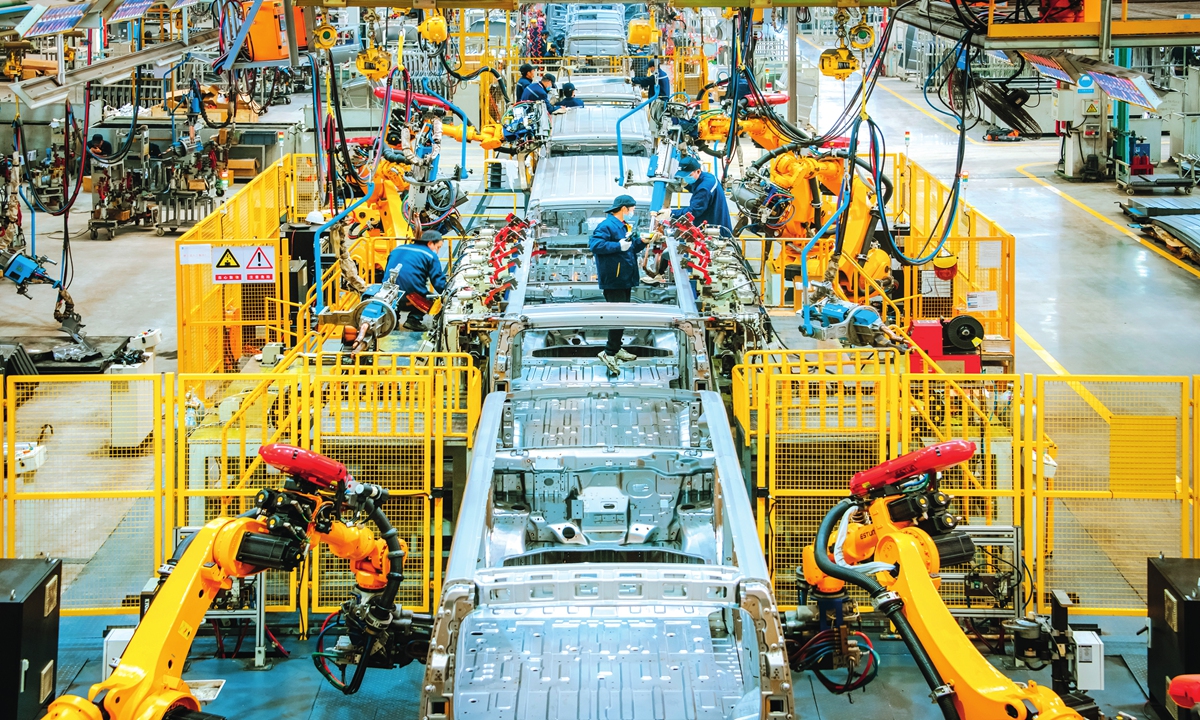
Staff members from a local NEV enterprise catch up on orders on the production line in Ganzhou, East China's Jiangxi Province on December 26, 2023.Photo: VCG
China is ramping up support for the development of new-energy vehicles (NEVs) and accelerating technology innovation to consolidate the industry's advantage, officials said at an industrial forum on Saturday.
The NEV industry in China is expected to see continued growth this year, building on its success in 2023, thanks to a competitive edge in the industry chain, experts said.
Zheng Shanjie, head of the National Development and Reform Commission, the country's top economic planner, called on key NEV manufacturers to focus on quality improvement, cost reduction, technological innovation and international cooperation to consolidate and expand their development advantages. Zheng made the comments at the 2024 China EV 100 Forum held in Beijing on Saturday.
The development of China's NEV industry demonstrates economic vitality, manufacturing improvement and China's commitment addressing climate change, Zheng said.
The forum, which marks its 10th anniversary this year, witnessed every milestone in the industry's development.
In the past decade, China's production and sales of NEVs have increased from 75,000 to 9.5 million annually, adding a new bright spot to China's manufacturing industry, Deputy Minister of Industry and Information Technology Shan Zhongde said at the same forum.
In 2023, production of NEVs exceeded 9.58 million, up 35.8 percent year-on-year. Sales hit 9.49 million, up 37.9 percent, while exports soared 77.6 percent to more than 1.2 million, according to the China Association of Automobile Manufacturers (CAAM).
In the first two months of 2024, production reached 1.252 million, up 28.2 percent, and sales reached 1.207 million, up 29.4 percent, according to the CAAM.
Addressing the development of Chinese NEVs, Shan said it is necessary to uphold fair and transparent economic and trade rules on the international level, while strengthening the development of vehicle chips and basic software, and continuously improving the low-temperature adaptability, safety and charging convenience of NEVs on the domestic front.
The remarks by senior Chinese officials clarified the strong support for the development of NEVs at the national level, Wu Shuocheng, a veteran automobile analyst, told the Global Times on Sunday.
In the domestic market, encouraging policies for trade-ins will continue to benefit buyers. Despite uncertainties in EU and US import policies, Chinese NEVs remain competitive in the overseas market, Wu said.
By establishing research and development facilities, sales centers and even complete vehicle factories in overseas markets, Chinese electric vehicles are effectively mitigating risks, Wu noted.
Shan said that the Ministry of Industry and Information Technology (MIIT) will enhance support for the high-quality, systematic and overseas expansion of China's NEV industry.
The ministry will tackle key technologies such as batteries, chips, operating systems and autonomous driving in order to enhance the resilience and competitiveness of China's NEV industry. It also pledged to improve the policy system to support leading enterprises to grow larger and stronger while phasing out outdated companies.
The MIIT also vowed to expand NEV trade-ins, consumption of connected vehicles and trials of high-level autonomous driving in urban areas. The ministry is also committed to assisting NEV companies to expand overseas and it welcomes global auto companies to invest in China.
China's NEV advantages lie in its large-scale production capabilities, low costs, high quality, accumulated experience and leadership in smart technology, Zhang Xiang, visiting professor at the Engineering Department of Huanghe Science and Technology University, told the Global Times on Sunday.
The next stage of development should be focused on core technological innovation such as intelligent connectivity and autonomous driving, as well as advances in automotive chips, operating systems and software, Zhang said.
The Government Work Report delivered at this year's national legislature session stressed the role of the automotive industry in stimulating consumption and enhancing the country's industrial competitive advantage.
China will boost spending on intelligent connected NEVs, consolidate the advantage of connected vehicles and build more charging facilities, among the tasks for 2024, according to the Government Work Report.



